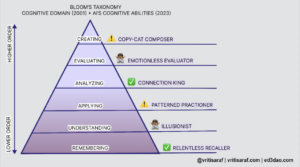Persistence Could be Key to Fluency
Understanding the mechanics of problem solving is one part of math competency. The ability to apply that knowledge in a variety of settings including quick estimations—procedural fluency—is an equally important aspect. There’s lots of research behind Carnegie Learning’s math program but they thought they were better a problem solving than procedural fluency and, for that, they turned to games.
A Next Gen Learning grant of $750,000 (announcement below) will help Carnegie Learning and a group of partners to build learning games likely to build procedural fluency.
The consortium includes NYU Games for Learning; Games to Learn at UNC Charlotte; PlayPower in Pittsburgh, Carnegie Mellon University and several community college groups. Carnegie Learning picked partners with experience in play testing for the critical challenge of calibrating the games so they are not to easy and not to hard.
Carnegie Learning founder and CEO Steve Ritter believes calibration is key to motivation
Ritter said the consortium will apply three measures of learning, 1) are students getting better at the game?, 2) do they succeed at other games? (i.e., confirm that they didn’t just game the game), and 3) can they transfer the skills to other tasks and demonstrate learning on external measures?
The grant will allow partners to mine the data for new understanding. Ritter is convinced that incorporating learning game strategies into math instruction will provide better diagnosis of learning and will build motivation, persistence, and fluency.
Carnegie Learning Math Project Awarded Next Generation Learning Challenges Grant
Gates/Hewlett-Designed Program Funds $750,000 Project to Improve Math Courses for College Readiness
PITTSBURGH, PA, April 7, 2011 – Carnegie Learning, Inc. has been awarded a $750,000 grant from Next Generation Learning Challenges (NGLC), a new initiative focused on identifying and scaling technology-enabled approaches to improve college readiness and completion, especially for low-income young adults, in the United States. The award will fund The Mathematics Fluency Data Collaborative, a project to improve performance in developmental math courses by building games to help students develop the fluency and number sense required to succeed in mathematical problem solving. Carnegie Learning is one of 29 grantees selected from a field of more than 600 pre-proposals and 50 finalists.
The NGLC initiative plans to advance college readiness and completion by addressing a continuum of interrelated issues spanning secondary and postsecondary education from grades 6 through college. NGLC is led by EDUCAUSE in partnership with The League for Innovation in the Community College, the International Association of K-12 Online Learning, and the Council of Chief State School Officers. The Bill & Melinda Gates Foundation and the William and Flora Hewlett Foundation helped design the Next Generation Learning Challenges and funds the initiative.
A collaborative project led by Carnegie Learning, The Mathematics Fluency Data Collaborative is a partnership among the Games for Learning Institute (G4LI) at New York University; Game2Learn at the University of North Carolina, Charlotte; the Pittsburgh Science of Learning Center at Carnegie Mellon University; Pellissippi State Community College in Tennessee; and the Playpower Project. The Washington State Board for Community and Technical Colleges, Pellissippi State Community College, Boise State University, and Carlow University are implementation partners.
“The Mathematics Fluency Data Collaborative will establish a practice that values iterative testing and refinement of learning games based on careful examination of student data,” said Dr. Steve Ritter, chief scientist for Carnegie Learning, Inc. and the project director. “Our team of researchers will mine the data to better understand which gaming parameters lead to success. The game code will be released under an open source license, so that the games can serve as a model for additional development as well as a platform for researchers interested in developing and testing improvements to the games.”
Games produced under this effort will be included in future releases of Carnegie Learning’s Cognitive Tutor® and MATHia™ software programs for middle school, high school, and post-secondary students aligned with the Common Core State Standards for Mathematics. In addition to funding, NGLC is gathering evidence about effective practices and working to develop a community dedicated to these persistent challenges.
“The Games for Learning Institute is pleased to participate in the The Mathematics Fluency Data Collaborative which allows us to continue building the science of learning with partner universities, games design researchers, and corporate partners,” said Jan Plass, professor of educational communication and technology and co-director of G4LI at New York University. “This is a significant project in that we will be designing games that can improve student success in college while producing rich research data to help us verify the educational quality and impact of these games; and, it allows us to continue growing a highly interdisciplinary research and development community to study games as agents to transform education for a broad range of learners.”
About Carnegie Learning, Inc. (www.carnegielearning.com)
Carnegie Learning, Inc. is a leading publisher of innovative, research-based math curricula for middle school, high school, and post-secondary students aligned with the Common Core State Standards for Mathematics. Providing differentiated instruction to schools across the United States, Carnegie Learning is helping students to succeed in math, creating a gateway to graduation and preparing them for the 21st century. Founded by cognitive and computer scientists from Carnegie Mellon University in conjunction with veteran mathematics teachers, Carnegie Learning is helping to re-invent the way we teach math, empowering students to produce significantly improved math scores in a diverse spectrum of school districts across the nation. By constantly innovating and developing new ways for students to learn, Carnegie Learning is ensuring schools, teachers and students achieve greater success. Carnegie Learning, Inc. is located in Pittsburgh, PA.
####








JEveretts
Thank you Ms. Talcott for fighting for us and our children!
Please keep us update.
JK